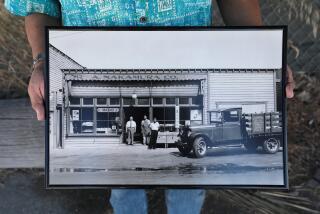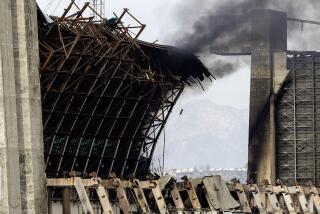Marines’ Families at Base Will Lose Most If It Closes : Military: In a neighborhood where friends helped each other survive war’s hardships, the news about possible shutdown brings sorrow.
- Share via
TUSTIN — Since moving to the cul-de-sac inside the Marine Corps Helicopter Air Station three years ago, Debbie Guddeck has never had to think about locking the doors while bicycling to the post office or worry about her boys playing near the street in front of the house.
“There is a lot of family unity here,” Guddeck said.
Indeed, while loved ones were away fighting in the Persian Gulf, the neighbors bound themselves in friendships that reached beyond traditional Marine Corps ties--a throwback to the days when neighbors actually knew each other and their children were best buddies.
This is also a neighborhood controlled by the finicky needs of the military, where the uprooting of families is a way of life. Still, Guddeck and her friends on Bennett Circle never thought the Marine Corps Air Station at Tustin would be on the Pentagon’s hit list for closure.
“I can’t believe that they would want to cut back at this base,” Guddeck said Friday. “We need these forces. I don’t know what the families are going to do here. It’s going to change the whole community around.”
News of the Pentagon’s decision to close Tustin and 30 other domestic military installations had reached station residents by early Friday afternoon through a network of telephone calls after Defense Secretary Dick Cheney’s morning briefing in Washington.
Under the Pentagon’s plan, Tustin and the other targeted military installations wouldn’t cease operations for at least three years, and base housing would be used to accommodate families of Marines assigned to the nearby El Toro Marine Corps Air Station.
Yet the announcement came as a surprise to most residents, some of whom are still welcoming loved ones home from the Gulf War.
On Bennett Circle on Friday, yellow ribbons were still fastened to every garage door, homecoming signs hung from back-yard fences and American flags were flying from virtually every front porch.
Guddeck, who is scheduled to leave the station in June for a transfer to Cherry Point, N.C., with her husband, Maj. William Guddeck, and three boys, was worried about how the news would affect her neighbors, Chief Warrant Officer Jack Hudson and his wife, Elizabeth.
“When the war started, we were all there for each other,” Guddeck said. “Here, you know everybody.”
Since Jack Hudson is assigned to El Toro, it is possible the family could remain in their home without worry. However, it is clear the residents would dread an order that would break them apart.
With her husband in Saudi Arabia, Elizabeth Hudson remembers how she turned to a neighbor to help her through the birth of her daughter, and the recent fun she had decorating the homes on her street for the troops coming home.
“In the military, everyone tends to go their separate way, anyway,” Hudson said. “But the rapid deployment of troops helped draw everybody together.”
When she leaves in June, Guddeck says she will miss the friends who brought her chicken soup and took care of the kids when she was sick and her husband was in the Gulf.
Two years ago, during a difficult pregnancy, she said friends saw her through a bout with a fever, pumping her with Gatorade and cooling her with wet cloths.
“You wouldn’t find that living out in town,” Guddeck said.
Across the circle, Sherry Pedersen said that living on the Tustin base has been an affordable way to live in pricey California and a secure environment for her children.
“The neighbors are so helpful and supportive,” Pedersen said. “There is a bond among us nobody could understand unless they walked in our shoes.”
More to Read
Sign up for Essential California
The most important California stories and recommendations in your inbox every morning.
You may occasionally receive promotional content from the Los Angeles Times.













